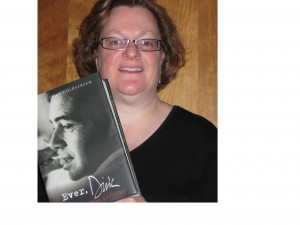Academic Librarian (Cataloger)
Education and Qualifications
M.L.S., Kent State University
B.A., Political Science, Kent State University
Professional development workshops and coursework
Describe a typical day on your job.
Librarians at academic institutions, especially larger ones, tend to be very specialized. I’m a cataloger, which means I don’t have any responsibilities for reference, instruction, circulation, or interlibrary loan—the “public†face of most libraries. And even within cataloging, there is further specialization. My current areas are quality control for the online catalog and cataloging of music materials such as scores, CDs, and DVDs. That said, there’s a great deal of variation in my work, and on a given day I might be: tracking down and correcting errors in the database; listening to a CD so that I can identify the music on it and preparing a catalog entry; answering e-mail; attending meetings; conducting performance reviews for the staff I supervise; creating procedural manuals; reading professional books or articles; learning new software; working on a special project to digitize library materials; writing a report; attending a professional conference; performing service activities for campus committees or professional organizations; or conducting and writing research in my field. In a past position, I traveled to newspaper offices, historical societies, and libraries in my state to inventory and microfilm newspapers.
How do you use German?
The primary focus of our music collection is Western art music, for which German is an important language. So I find that I have to catalog a lot of scores or CDs in that language. That’s actually why I started learning German, because prior to that my language background was in Spanish and French. After having taken several literature courses, I gained the additional job responsibility of working with the faculty to select German language and literature materials for our library collection, and that’s a lot of fun. As needed, I also translate invoices, letters of inquiry, and other German correspondence received by the library. I can’t claim to be fluent, but I do use German frequently in my position.
What are the advantages and disadvantages of your job?
Working in higher education means that I’m around a lot of diverse and creative people, and there are always opportunities for learning. I really like that. In fact, the whole library profession is evolving rapidly right now, and while that can be a challenge, it’s a great stimulus for developing new knowledge and skills. It’s also exciting to work with a host of different library materials and make them readily accessible to our users (or at least that’s the goal). Because there are so many specialties within the profession, there’s a great deal of choice about the type of work you can do and the setting (academic institution, public library, school, law library, business, etc.).
Academic librarians often have faculty rank and are expected to earn tenure and promotion. This in turn requires research, publication, and professional service. While I enjoy this aspect of my job, it could be considered an advantage or a disadvantage depending on your own inclinations. The daily schedule of academic librarians is somewhat inflexible, as many are on 12-month contracts and are generally expected to be in the office 40 or more hours a week; each institutional culture determines whether research is done entirely on your own time or not.
Although there are exceptions, librarians tend to be some of the lowest-paid professionals. And contrary to popular myth, we don’t get to read (for pleasure) on the job—a real temptation when surrounded by all those books!
Do you have any advice for someone who would like to enter your field?
Most professional librarian positions require a master’s degree from an institution accredited by the American Library Association (or foreign equivalent). This is normally considered a terminal degree, although some academic libraries require an additional subject master’s for promotion and/or tenure. (A Ph.D. is generally needed to teach in a school of library and information science.) However, most academic backgrounds are useful for librarians, so you don’t have to have prior preparation in a given area to be accepted into a master’s program. When selecting a school, make certain it offers classes in your area of interest. For instance, some graduate programs today offer little or no cataloging instruction. If you don’t have any actual work experience in a library setting, it’s a great idea to complete an internship as part of your professional education.
Good writing and communication skills are essential for work in an academic library, and knowledge of at least one foreign language is a very common job requirement for cataloging positions. Currently, our profession is very much driven by the constant changes in information technology, so if you don’t like technology, you might not be happy in the field.
